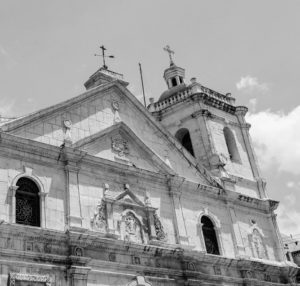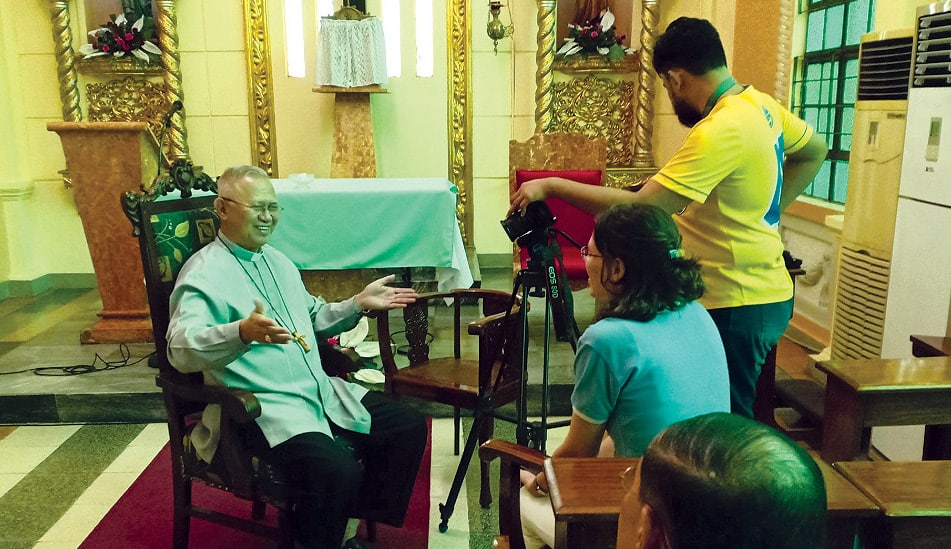Can you share with our readers about the Festival of Faiths? Who were involved in this event and what was its aim?
Fr. Alvin: On the first week of October, the priest-in-charge of the youth commission of the Archdiocese of Cebu opened to me the idea of having the closing of the Year of the Youth and the launching of the Year of Ecumenism, Interreligious Dialogue and Indigenous Peoples together.
It was with a lot of fear and uncertainty that I came for the first meeting. There were representatives of the Church of Jesus Christ of Latter-day Saints, the United Methodist Church, the United Church of Christ in the Philippines (UCCP), and among those representing the Catholic Church were the Focolare local community of Cebu.
From other religions were Buddhists of the Fo Guang Shan Chu Un Temple, some Baháʼí faithful, and Muslim youths. I was glad that when I said, “We are few, we don’t have many resources but…” – suddenly pausing and a bit hesitant to continue – a respectable person from a Christian church added – “We are one!” This proved to be the strength that made us overcome the challenges together.
What specific contributions did the Focolare have in this historic event?

Alessandra: When these plans started to take shape, although we were a small group from the various realities of the Focolare, we felt that we had to give our unconditional support to Fr. Alvin.
Since the beginning, I felt a great joy in being with brothers and sisters of other churches and religions. With some of them, there is already a personal friendship, thanks to several Weeks of Prayer for Christian Unity celebrated together in the past years. One of us has been in close contact with a group of pastors from other Christian churches. And this occasion proved to be an opportunity to deepen unity among all. I believe that the specific contribution we were able to give in the event is UNITY, the very spirit that animates the Focolare.
This event was not only intended to gather together the head of the different Christian churches and religions. There was also the involvement of young people. How did you involve the young and help them work together? And what was the result of this working together?
Alessandra: We were embarking on something new since it was the first time for the youth to gather and work together to prepare an event. We invited the young people of the Focolare, the Gen, who have responded positively and showed their willingness to get involved. For two months, various meetings were organized and attended by both adults and youth, and held in the Archbishop’s residence. We were a well-assorted group!

For the Catholics, there were youth representatives from the Diocesan Commission on Youth, together with the Gen boys and girls. From the other Christian churches and religions, there were youth from the United Methodist Church, the United Church of Christ in the Philippines (UCCP), as well as Buddhist, Baháʼí, and Muslim youth.
It was not at all easy at the beginning to work together, due to differences in personalities. But this did not hinder us in building relationships with all. For example, choosing the title of the event became a concrete way to build unity among all. Together with the Gen, we agreed to give importance to the contribution of each one, and try to welcome the different opinions.
I understood deeply that my role there, as for all of us from the Focolare, was “to be Mary,” meaning, to be that warm and welcoming presence which makes everyone feel comfortable. To do this, we often declared to each other “Let’s keep Jesus among us!” And each of us was committed to taking particular care of our personal rapport with each one, believing that it is only on the basis of this rapport with each of these religious leaders and young people, that this dialogue can go ahead.
As a priest and a representative of the Catholic Church in the Archdiocese of Cebu, you found yourself among the leaders of the various Christian Churches and religions. What impact did this have on you?
Fr. Alvin: Accompanied by a lay member of the Focolare, first, we visited the pastors and leaders of other religions in their respective churches, temples and other places of worship, showing our utmost respect and appreciation for their faith and traditions. It was a chance for me to get to know them personally to establish a rapport with each one. I felt that my physical presence was necessary to make unity among us more visible.
There are moments in my life as a priest that I am also reminded by the lay people how to be steadfast in the faith. For instance, during the last week of the preparations, there were three days of continuous rain, and I was of the idea of changing the venue to an indoor space. The same person who reminded me that “we are one” at the start of the preparations, assured me that there is only one thing to do: to have faith. And indeed, it happened: the rain stopped when all the preparations were over.

You mentioned that this event was historic. What mark did it leave on those who organized it and among those who participated?
Alessandra: I was following closely the group of the youth who started to work together, giving their contribution and sharing their time and talents. And to bring ahead the work and various logistical aspects, two separate chat groups were created: the youth named their chat “Happy Together,” while the adults named theirs “Festival of Faiths.”
Although the initial idea came from the adults, little by little, the youth became the prime movers of the program. This fostered a new kind of brotherhood, built not so much by the practical things they have committed themselves to, but by the reciprocal esteem that was created among all. And later, this was sealed by the oath we had formulated.
It was a kind of pact, an agreement to live for each other promoting respect, unity, and harmony among all – to be persons committed to dialogue. This oath was distributed to all the participants at the end of the Festival of Faiths.
Interview by Romeo Pelayo Vital




